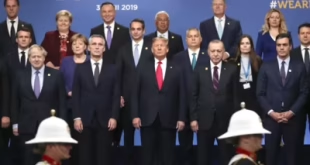- The quote comes from the writing of Karl Marx, where he references French General Napoleon Bonaparte.
- In this François Bouchot painting he is surrounded by members of the Council of Five Hundred during the Coup of 18 Brumaire.
- One of the most quoted remarks of Karl Marx, the German philosopher and political theorist, popularly known as the ‘Father of Communism’, is “History repeats itself, first as a tragedy, second as a farce”.
- The quote has made its way to common usage through the years, especially the initial part of ‘History repeats itself’.
- From history teachers educating batch after batch of students to political commentators trying to understand recent developments, Marx’s words seem to be a good fit for many occasions.
What is the full quote?
- The quote is from the beginning of an essay by Marx, called ‘The Eighteenth Brumaire of Louis Bonaparte’ (1852), originally published in German as ‘Der 18te Brumaire des Louis Napoleon’.
- It is to be noted that the quote as it is commonly used in day-to-day conversations does not appear in the essay; rather, it is an extraction or interpretation, of what Marx actually .
- Here is Marx’s original writing: “Hegel remarks somewhere that all great world-historic facts and personages appear, so to speak, twice.
- He forgot to add: the first time as tragedy, the second time as farce.
- This portion introduces the reader to the main topic of the essay: the French coup of 1851, in which Napoleon III assumed dictatorial powers.
- Marx contrasts this with the Coup of 18 Brumaire, in which Napoleon Bonaparte seized power in revolutionary France (9 November 1799, or 18 Brumaire Year VIII in the French Republican Calendar).
Meaning
- To put it very simply, the quote refers to how humans rarely learn from mistakes of the past, be it their own or someone else’s.
- When the mistake is repeated the first time, it is a tragedy, a sad reminder that it is not too late to learn and do better the next time.
- However, when it is repeated for the second time, it is more absurd, making it almost funny (a farce often refers to an event or situation that is comically absurd), than tragic and unfortunate.
- It is also because it ends up going against the expectation that age or experience results in wisdom.
- It is also interpreted as an observation of how every generation seems to think they are smarter and better-equipped than the previous ones, and yet, they end up making the same mistakes, sometimes with graver consequences.
- In the original passage, the comparison between the uncle and the nephew can be read as an instance where the next generation is doomed to repeat what the older one did, simply because they did not learn from it.
- Their inability to recognise the same flaws in their actions and judgements condemns them to the same fate as their predecessors.
- The use of the word ‘farce’ is meant to reinforce how the constant cycle of mistakes being repeated lends itself to comedy, although of a very dark kind.
- In fact, this trope is often utilised in comic situations in literature and movies, wherein the characters keep on replicating mistakes and misunderstandings in increasingly absurd ways.
- This is even more common in television shows, particularly sitcoms, where the endless nature of the episodes acts as a fertile ground for an ever-repeating comedy of errors.
- The phrase is frequently used to talk about events in international and national politics.
- During the American military’s exit from Afghanistan in 2021, the Taliban takeover was described often as a case of ‘history repeating itself’, given its earlier emergence in the early 1990s after the Soviet Union troops left the country.
- Humility was not a hallmark of US policy in Afghanistan, even though Bush and his advisers understood that the country was called ‘the graveyard of empires’ for good reason.
- Britain had a misadventure there in the 19th century.
- The Soviet Union had its own in the late 20th century. Somehow, Bush thought 21st-century America would be different.”
- ‘Those who do not learn from history are doomed to repeat it’
- Another quote, along the same lines as Marx’s, is “Those who do not learn from history are doomed to repeat it”.
- It was most likely by Spanish philosopher George Santayana, and in its original version appeared as the aphorism (a sparsely-worded observation containing a general truth) “Those who cannot remember the past are condemned to repeat it”.
- It is often misattributed to Irish statesman Edmund Burke, and also at times to Winston Churchill, the former British prime minister.
SOURCE: THE TIMES OF INDIA,THE INDIAN EXPRESS
 Chinmaya IAS Academy – Current Affairs Chinmaya IAS Academy – Current Affairs
Chinmaya IAS Academy – Current Affairs Chinmaya IAS Academy – Current Affairs



